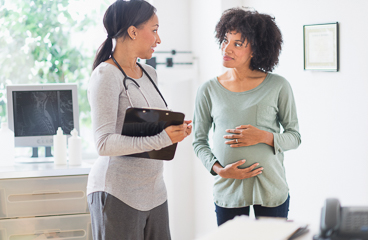Belly Pain in Pregnancy: Care Instructions

Overview
When you're pregnant, any belly pain can be a worry. You may not want to call your doctor or midwife about every pain you have. But you don't want to miss something that is dangerous for you or your baby.
Even if it feels familiar, belly pain can mean something new when you're pregnant.
It's important to know when to call your doctor or midwife. It will also help to know how to care for yourself at home when your pain is not caused by anything harmful.
- When belly pain is more severe or constant, see a doctor or midwife right away.
- If you're sure your belly pain is a sign of labour, call your doctor or midwife.
- When belly pain is mild and brief and comes and goes, it's usually a normal part of pregnancy. It might be related to changes in the growing uterus. Or it could be the stretching of ligaments called round ligaments. These ligaments help support the uterus. Round ligament pain can be on either side of your belly. It can also be felt in your hips or groin.
- Mild belly discomfort can also be related to digestion. Things like constipation, bloating, and heartburn are common during pregnancy.
Follow-up care is a key part of your treatment and safety. Be sure to make and go to all appointments, and call your doctor or nurse advice line (811 in most provinces and territories) if you are having problems. It's also a good idea to know your test results and keep a list of the medicines you take.
How can you tell if belly pain is a sign of labour?
When belly pain is caused by labour, it can feel like mild or menstrual-like cramps in your lower belly. These cramps are probably contractions. They can happen in your second or third trimester.
You may also have:
- A steady, dull ache in your lower back, pelvis, or thighs.
- A feeling of pressure in your pelvis or lower belly.
- Changes in your vaginal discharge or a sudden release of fluid from the vagina.
If you think you are in labour, call your doctor or midwife.
How can you care for yourself at home?
When belly pain is mild and is not a symptom of labour:
- Rest until you feel better.
- Take a warm bath.
- Think about how you move if you are having brief pains from stretching of the round ligaments.
- Try gentle stretching.
- Move a little more slowly when turning in bed or getting up from a chair, so those ligaments don't stretch quickly.
- Lean forward a bit if you think you are going to cough or sneeze.
- If you have digestive discomfort, think about what you drink and eat.
- Drink enough fluids. Choose water and other clear liquids until you feel better.
- Try eating small, frequent meals. If your stomach is upset, try bland, low-fat foods like plain rice, broiled chicken, toast, and yogurt.
When should you call for help?

Call 911 anytime you think you may need emergency care. For example, call if:
- You have sudden, severe pain in your belly.
- You have severe vaginal bleeding.
- You passed out (lost consciousness).
- You have a seizure.
Call your doctor, midwife, or nurse advice line now or seek immediate medical care if:
- You have new or worse belly pain or cramping.
- You have any vaginal bleeding.
- You have a fever.
- You have symptoms of preeclampsia, such as:
- Sudden swelling of your face, hands, or feet.
- New vision problems (such as dimness, blurring, or seeing spots).
- A severe headache.
- You've been having regular contractions for an hour. This means that you've had at least 6 contractions within 1 hour, even after you change your position and drink fluids.
- You have a sudden release of fluid from your vagina. (You think your water broke.)
- You have new or worse vaginal discharge.
- You have symptoms of a urinary tract infection. These may include:
- Pain or burning when you urinate.
- A frequent need to urinate without being able to pass much urine.
- Pain in the flank, which is just below the rib cage and above the waist on either side of the back.
- Blood in your urine.
Watch closely for changes in your health, and be sure to contact your doctor, midwife, or nurse advice line if you are worried about your or your baby's health.
Where can you learn more?
Go to https://www.healthwise.net/patientEd
Enter B275 in the search box to learn more about "Belly Pain in Pregnancy: Care Instructions".
Current as of: April 30, 2024
